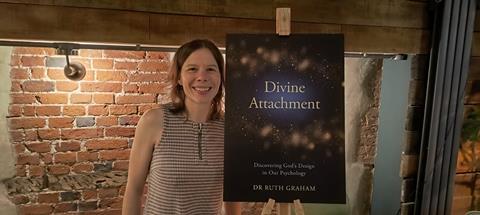Clinical psychologist, Dr Ruth Graham shares how psychological truths have helped her have greater patience and hope in her identity as a child of God.

I’ve been a Christian since I was young and am grateful for having a deep-rooted faith in God. At the same time, my familiarity with faith ironically dampened my curiosity about God. I accepted that God is my father, without querying why he would be that for us. Similarly, I believe we are made in his image, yet much of the complexity of this had passed me by.
It has been my training and work as a clinical psychologist that has stirred my intrigue, leading to awe and wonder at our amazing father God
It has been my training and work as a clinical psychologist that has stirred my intrigue, leading to awe and wonder at our amazing father God. Did you know, for example, that a parent’s delight helps the baby to grow? An interesting psychological insight that has greater spiritual significance when we reflect on God’s delight over us. My book, Divine Attachment has been written both as an act of responsive worship to God and as an invitation to others to discover God’s design in our psychology, as I have.
Why I created - Faith In me Therapy
Much of the material for Divine Attachment has emerged out of my work with foster families. When children have had very troubling early life experiences, it has a profound effect on how they relate to themselves, the world and others. Parenting children affected by trauma requires the adults to be able to manage both their and their child’s emotions, which is no easy task. The field of psychology shows that children fare better when the adults caring for them are clear on who they are and their own history. How significant for us then, to consider that our heavenly father is completely certain on who he is.
Adoption is a biblical story most Christians are familiar with.
Adoption is a biblical story most Christians are familiar with. Yet when we consider the reality of losing one family and being planted in another, the consequence of this can often feel incredibly destabilising. Fostered and adopted kids have often built ways of being that were based on their old families. In their new families, things can seem very different and confusing. The Genesis story evidences our own tricky beginnings and need for rescue. The psychology shows us that rather than adoption being an instant solution, it’s the beginning of slow relationally driven change. I’ve been surprised at how these psychological truths have helped me have greater patience and hope with my own identity as a child of God.
Is therapy okay for Christians?
As both my heart and head knowledge of early relationships has grown, I’ve come to recognise that many of the psychological and biblical truths mirror each other. The psychological perspective, for example, tells us that looking into the face of another has marked impact on our development. God’s frequent instruction to seek his face seems beyond coincidence. A more obvious example of the psychological and spiritual overlap is the clear evidence of our design for connection with others. As I’ve discovered more and more of these parallels, Divine Attachment has been written.
The psychology of our relationships carries hopeful impact for us all. While our early years mark a time of crucial development, God has also designed us with brains, bodies and relationships that can change, adapt and grow throughout life. This is part of what it means to be designed for connection, an indication of one way in which we’re made in God’s image. Our capacity for growth also enables us to be changed by each other and by God himself.
Looking after your emotional health as a mother
The field of psychology confirms we are relational beings and that we can relate to others in ways that bring hope, healing and restoration. I believe my book is an invitation to discover more about God’s psychological design over and in you. It has also been written with the hope and prayer that through reading, you’ll learn how intricately you’re loved and how we can offer this care and love to one another.

































No comments yet